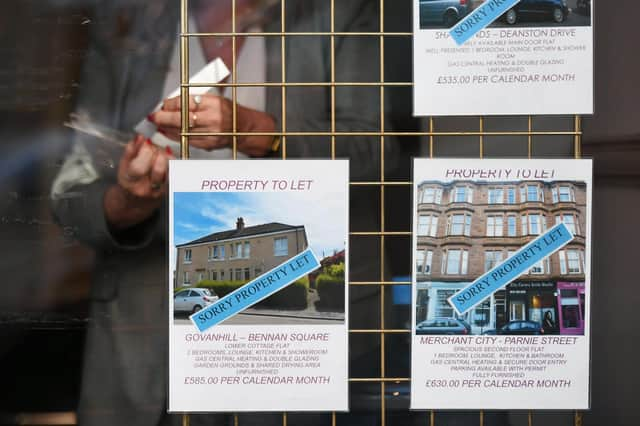Landlord confidence remains buoyant... for now - David Alexander


The past ten years have, however, been somewhat different. Savers have suffered badly as our government reduced interest rates to almost zero to boost economic recovery from the effects of the last credit crunch and have effectively fallen into “negative equity”. For many, the £1,000 per annum tax break on interest, introduced by former Chancellor George Osborne, is now almost meaningless. For example with an account paying 1 per cent you’d need around £100,000 deposited in a bank or building society before starting to benefit.
But the forthcoming tax year promises to be even worse for savers – indeed the worst since the hyper-inflation of the 1970s – with base rate still somewhat south of one per cent and inflation predicted to hit at least five per cent (and some economists warning that this rate might not be as “temporary” as our government would have us believe).
Advertisement
Hide AdAdvertisement
Hide AdIt is for this reason that, while accepting the general principle of last week’s plethora of news stories about the rising cost of private renting, especially within Edinburgh, I disagree with the sentiment that many landlords are likely to sell up while the sales market too remains buoyant because of more impending regulation from Holyrood and the possibility of higher taxation by Westminster.


This might seem ironic coming from a column which regularly warns against this potential double whammy but the fact remains that net rental income plus capital growth is still sufficient for most landlords to want to stay in the market and for new ones to come on board.
Especially when you consider the alternative – i.e. see above. Yes, a shares-based portfolio does offer the prospect of better returns but the FTSE 100 hasn’t exactly shone either over the past ten years, has it?
Those landlords currently exiting the market tend to be of or near to retirement age and wanting to sit back and enjoy the fruits of their property “venture”.
So if the rise in rents is not down to landlords selling up (and reducing the level of stock) what exactly is the cause?
There tends to be a misconception that owner-occupiers and tenants exist on different planes when, in fact, they are mostly one and the same.
The average tenant can no longer be characterised as a young single person or two young spouses or long-term partners renting temporarily before moving on to owner-occupation. Tenants encompass all age groups and the same circumstances that requires home-owners to move house applies to those who rent as well – change of job, redundancy, retirement, marriage, separation and divorce, growing families, etc. The pandemic has also played a direct part; for example, flats with balconies, especially larger ones, and basement flats with gardens are even more sought after than before because of a perceived need for outdoor space – or more of it.
This creates additional activity just among current tenants (without the added dimension of those renting for the first time) and inevitably leads to higher rents being achieved. As a practical example of this, a week ago our Edinburgh office logged 40 vacant properties whereas the number would normally be four times that number at this time of year.
Advertisement
Hide AdAdvertisement
Hide AdA word of caution, however. While the possibility of further regulation is clearly not dampening the current market there are genuine concerns as to what will emerge, in law, from the Scottish Government’s New Deal for Tenants consultation.
A new deal for tenants may not in itself be a bad thing but if “pro-tenant” also means “anti-landlord” then those fearing a substantial withdrawal of the latter may not be too wide of the mark after all. And should that happen the inevitable reduction in properties and subsequent rise in rents will make the current surge seem miniscule by comparison.
David Alexander is managing director of DJ Alexander
Comments
Want to join the conversation? Please or to comment on this article.